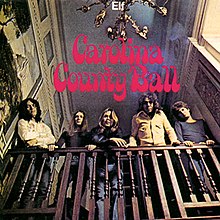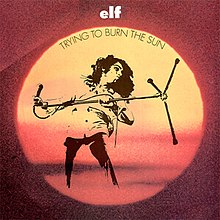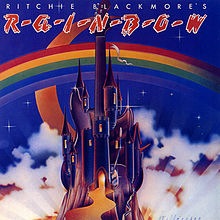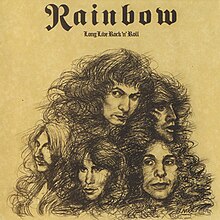Broken Rainbow
A Tribute to the Life and Work of Ronnie James Dio
(July 10 1942 - May 16 2010)

The chances are, if you call yourself any sort of a metal fan at all, your path has crossed that of one Ronald James Padavona, better known as Ronnie James Dio. From Rainbow to Black Sabbath and on into his own band, Dio, Ronnie carved out a path to glory through the highest echelons of heavy metal, working with, and earning the respect of, giants like Geezer Butler and Tony Iommi, Cozy Powell and Richie Blackmore, and gaining a huge following, which seemed to transfer with him as he went from band to band. He was a tireless campaigner for several worthy causes, including the Children of the Night, an organisation which attempts to save children from falling into prostitution, and he had a huge regard for the dispossessed and the lost.
Originally written in 2012, one year after I had returned to the forum, this was my tribute to a man who certainly left his indelible mark on metal and who is sadly missed, nearly twelve years gone now. In this special feature I will be looking at his long and varied career, from his start in Elf through his association with Rainbow and Black Sabbath, into the eventual and perhaps inevitable formation of his own band. Ronnie never wrote or sang on any chart-topping singles, and to the masses outside of heavy metal and rock he may be virtually unknown, but to those who knew and loved his music, the man was indeed what his assumed surname translates as, a true god of rock and roll.
Part I: Dio Rising
Ronnie was born in Portsmouth but soon moved to New York, and remained in America for most of the rest of his life. He originally played the trumpet and French horn, but even in his early bands a natural ability to sing - which he apparently attributes to the special kind of breath control it's necessary to learn in order to play the French horn - was evident, and he soon took over vocals in his first band, which went through many namechanges but eventually settled on Ronnie and the Prophets. This was back in 1961, and that band lasted till 1967, when he disbanded it and with their former guitarist, Nick Pantas, formed the Electric Elves, later shortening the name to Elf in 1969. For all intents and purposes, this is where, musically, we pick up the story.
Elf - Elf - 1972 (MGM)

Although Ronnie's heavy metal roots would not really show until he joined Rainbow, his first “real” band, Elf, does display his love of rock and roll. Heavy in its way, but more in a Creedence/Zep way than a Deep Purple/Sabs way, their debut album, self-titled, certainly rocks, and you can hear from the very off the powerful set of pipes that were to set the world of heavy metal alight for over forty years. Elf put out three albums over their eight year incarnation, one of which was a live effort.
Although they were in fact together since 1967, after Ronnie disbanded his previous band, Ronnie and the Prophets, they began life as The Electric Elves and only changed their name to Elf in 1969, on which name they put out their debut three years later. So in a real, recording sense, Elf only lasted from 1972 to 1975, when Ronnie joined Rainbow: three years, and so that much more impressive that they released three albums within that time. Their debut was produced by Ian Paice and Roger Glover from Deep Purple, who were so impressed with the band that they had them open for them on their tour, giving Elf a lot more exposure than they could ever have hoped for at that time.
For a debut, it's a pretty damn fine album, with tracks like the opener “Hoochie Coochie Woman” and the ballad-that-metamorphoses-into-a-slowburner-blues “Never More” standing out in particular. The keyboard work of Mickey Lee Soule stands out, but it is of course the vocals of Ronnie - who at the time was going under his given name of Padavona, and who, on this album only, also plays bass - which really catches the attention and hints at a star in the making. There's a certain sense of a heavier Bob Seger to “I'm Comin' Back For You”, with some fine piano playing from Soule, but it's the epic southern boogie of “Dixie Lee Junction” that becomes the album's standout, a powerful slice of rock and blues with some great time changes.
Carolina County Ball - Elf - 1974 (MGM)

1974 saw the release of Elf's second album,
Carolina County Ball, a somewhat less heavy album than the debut, with more of an emphasis on the blues side of their music. Tracks like the title, relying heavily on a brass section presumably created on Soule's keyboards and the riotous joy of “LA 59” still make the album very listenable, and if nothing else it's notable for the first time I can see that Ronnie's love affair/obsession with rainbows begins, with the seventh track titled simply “Rainbow”. Though, to be fair, the premise for using this title is pretty shaky, and the song certainly does not live up to its promise.
By this point, Elf had brought a dedicated bass player on board, so Ronnie was able to concentrate on his singing duties, also sharing the writing of all the songs with Soule. Although the tracks in general are good - not great: I far prefer the debut - there are those that let it down, like the overlong and quite whiny and boring, perhaps misnomer “Happy”, and the flat, lifeless closer, “Blanche”. At this point destiny was calling anyway, Ritchie Blackmore deciding he'd just about had enough of Deep Purple and thinking of starting his own band, which would eventually absorb not just Dio but most of the remaining, ahem, elves.
Trying To Burn the Sun - Elf - 1975 (MGM)

The pointy-eared ones returned to their rockin' roots for their third, and as it turned out, final album, one year later. Much heavier than the very disappointing
Carolina County Ball, their swansong,
Trying To Burn the Sun even had Elf experimenting with strings and orchestration when they employed the Mountain Fjord Orchestra on the track “When She Smiles”, a sort of Beatles/Beach Boys hybrid.
The writing was, however, on the wall. During the recording of this album, Elf were also working with Ritchie Blackmore on his first solo album, which would in fact become Rainbow's debut. After the album was released though, everyone bar Dio was fired by Blackmore, and thus ended the association of Ronnie with his band, as he became an integral part of Rainbow, not only singing but also co-writing most of the band's songs, and bringing his own style and flair to them.
Ritchie Blackmore's Rainbow - Rainbow - 1975 (Polydor)

From the off, Ronnie was more than just a vocalist or writer. He helped Blackmore shape his vision of his new band along lines both were happy with. Ronnie had always been interested in medieval times, but his last band hadn't really allowed him any scope in this area. Blackmore, coming off of Deep Purple's flirtation with fantasy themes, was more willing to explore this side of things and so together they composed “Sixteenth Century Greensleeves”, “Man On the Silver Mountain” and “The Temple of the King”. The album also afforded Dio his chance to stretch his lyrical muscles on the beautiful ballad, “Catch the Rainbow”, which would become a later standard.
It was clear that the partnership was a winning one, and Ronnie remained with Rainbow through what would perhaps be termed as their classic years, recording two more albums which are highly praised among the fans. Indeed, after Dio left the band, they took a much more commercial, almost pop turn, admittedly gaining their biggest hit singles with the likes of “I Surrender” and “Since You Been Gone”, but the fantasy, mythic and symphonic rock element left with Dio.
Rising - Rainbow - 1976 (Polydor)

I've already reviewed this album at length, so let me just state that it was and is a classic Rainbow album, perhaps
the classic Rainbow album, and served to showcase two consummate professionals and experts working at the very top of their game, with Dio shining on powerful vocal performances on the likes of “Tarot Woman” and “Do You Close Your Eyes”, while the double-epic that took up the second side of the album (ask yer da!), “Stargazer” and “A Light in the Black”, were together perhaps one of the most ambitious projects any heavy metal band had undertaken up to then. With a total running time of over sixteen minutes, they tell the tale of a man taken, with many others, to a strange land where they are forced to build a tower in the desert, a ladder up which an enigmatic sorcerer intends to scale to Heaven itself. He fails, and falls, and the second part is the story of the man's journey home.
While “A Light in the Black” was seldom performed live, “Stargazer”, which could stand on its own perfectly well, became a tried and trusted favourite with fans, but more importantly, showed Ronnie firmly stamping his authority on the music, carving out his own idea of what they should sound like, and laying the groundwork for the path he would follow through his long career. Many people will tell you that Rainbow just wasn't the same after Ronnie left, and they're right: the band really changed its sound, and a lot of the fantasy elements were lost from albums such as
Difficult to Cure, Bent Out of Shape and
Down to Earth.
On Stage - Rainbow - 1977 (Polydor)

Something of an anachronism and certainly a disappointment to the growing legions of fans who had sprung up after
Rising, this live album is notable for its exclusion of virtually anything from that album except for the rather tame “Starstruck”, and instead plunders most of Blackmore's first album, ignoring later-to-be-classics like “Stargazer” and “Tarot Woman”. One of the album's four sides is in fact given over to a thirteen-minute nonsense of one of Blackmore's old Deep Purple songs, with another taken up entirely by “Catch the Rainbow”. Why
Rising, released the previous year to critical acclaim, was so badly served on this album is beyond me. It's almost as if Blackmore was trying to completely ignore it.
Long Live Rock'n'Roll - Rainbow - 1978 (Polydor)

The last Rainbow album, then, to feature Ronnie, this 1978 effort is characterised by his signature lyrical themes, in tracks that would later become Rainbow classics, such as “Kill the King” and the title track, and one which Ronnie would adopt and play at his own live performances, the eastern-influenced “Gates of Babylon”. It also features what would become a staple of Dio's work, the appearance of a rainbow, either in the song title or lyric, and here we have the closer called “Rainbow Eyes”. This, in fact, would resurface on his second solo album, in the lyric to “Egypt (The Chains Are On)”, when he would sing
”They were frightening in the darkness/ They had rainbows in their eyes!”
In the same way that
Rising featured an orchestra playing on “Stargazer”, the Bavarian String Ensemble contributes to “Gates of Babylon”, and there are both cello and viola in “Rainbow Eyes”, a beautiful little minstrel-style ballad that closes the album and gives more space to Ronnie's love of the middle ages. There are some very heavy tracks on it though, and it pushes more away from the overt progressive rock of
Rising towards a more out-and-out rock idea, which would in the end be watered down by Blackmore as he sought to take the band in a more commercial direction, a position Ronnie disagreed with and which would see his leaving Rainbow after this.
It might well have been Blackmore's close-mindedness that led to Ronnie's departure from Rainbow, although it's more widely accepted that he left due to being unhappy with the more commercial direction Blackmore was pushing the band towards, and they parted company in 1979, as a new decade hovered on the horizon, and a new phase of the musical career of Ronnie James Dio was about to begin.